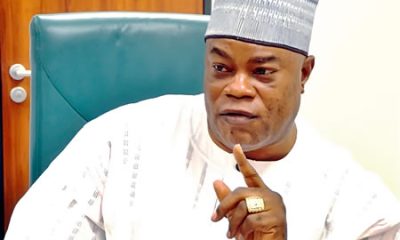COVER
Health Workers Migration Leaves Nigeria Severely Understaffed, Reps Lament

By Ubong Ukpong, Abuja
Chairman of the House of Representatives Committee on Health Institutions Amos Gwamna Magaji yesterday, disclosed that migration of health workers from Nigeria to other countries in search of greener pastures posses significant challenge to the nation’s health care system.
Magaji spoke just as the Minister of Health, Prof.
Mohammed Ali Pate warned against duplication of health institutions across the country; while saying it would be counter-productive to duplicate efforts especially in this era of scarce resources.Speaking at a public hearing on 16 bills aimed at establishing one health institution or the other, Magaji said the core of the hearing is to provide guidance on the actualization of the Federal Government’s commitment to improve the health care sector through the wide distribution of Healthcare Institutions in Nigeria.
He said that as a result of the growing population, there is need for reference hospitals closer to the people, particularly in rural and suburban areas.
According to him, tertiary health institutions in Nigeria are designed to provide tertiary healthcare services to complement primary and secondary care in the national healthcare system, adding that in order to develop and expand the country’s training institutions and ensure an equitable distribution of health manpower, the Federal Government must balance the inequality in the distribution of tertiary institutions across the country.
He argued that the mass exodus of health workers and professionals to other countries presents a significant challenge to Nigeria’s healthcare sector, saying “recently, there has been an enormous migration of doctors, Nurses and other health workers in search of “greener pastures” in other countries, leaving Nigeria’s health sector severely understaffed.
“The need to reposition the healthcare sector to meet numerous emerging challenges is crucial to its improvement.
“To succeed in this era, a system that is well invested in human resources and medical intelligence as the backbone of the health sector is required. The administrative appointment of capable persons based on merit in hospital management also has a role to play.
“Proper human resource management is critical to providing high-quality health care. Effective human resource management strategies are critical for improving health-care outcomes and access in Nigeria.
“As arguably the most important of the health system inputs, the performance and benefits the system can deliver depend largely on the knowledge, skills, and motivation of those responsible for providing health services.
“It goes without saying therefore, that this aspect of our health sector must be invested in to ensure a thriving and performing sector.
“The structural quality of a health system is heavily influenced by its healthcare infrastructure. As we carried out oversight functions to healthcare institutions across the country since the inauguration of this committee, what are undeniably evident are infrastructural deficiencies of health services, lack of equipment resulting largely from inadequate funding of health institutions by the government, and a total lack of maintenance culture for equipment provided.”
In his remarks, the Minister of Health said health sector research including that of the Cardiology is already taking place in many fronts in Nigeria, while establishing the institute will be an additional financial burden on government, adding that government is cutting down on the cost of governance by pruning down agencies of government.
Represented by a director in the ministry, Dr. Jimoh Olawale Salahudeen, the minister said the ministry remains enthusiastic and supportive of every effort geared towards ensuring growth and progress in the health sector.
He said while the ministry appreciates the effort of the House of the Representative in deepening healthcare services including training and research in the country, cardiovascular research is not in alert level than any other non-communicable diseases to warrant a compelling need for the establishment of National Institute of Cardiovascular Disease, Research and Treatment Centre, in Kano.
He said, “All the Federal Teaching Hospitals and Federal Medical Centres in Nigeria including those in the North West geo-political zone already have the mandate of Treatment of Cardiovascular Diseases, Research and Training of Health care professional including medical doctors who are specialist in the management of cardiovascular diseases and other related cases.
“The Federal Teaching Hospitals in Northwest geo-political zone include: Aminu Kano University Teaching Hospital Kano State, Anmadu Bello University Teaching Hospital Zaria Kaduna State, Usman Dan Fodio University Teaching Hospital Sokoto and Federal Teaching Hospital Katsina State, Federal Medical Center (FMC) Azare Bauchi State, FMC Birnin Kebbi in Kebbi State, FMC Birnin Kudu in Jigawa State, FMC Gusau in Zamfara State.
“These aforementioned existing Federal Tertiary Hospitals (FTHs)’ Cardiovascular Units have not been overstretched nor reportedly underserving the people in the geo-political zone.
“In addition, other State Tertiary Hospitals in this zone complement the effort of the FTHs in responding to some of the specialized cardiovascular cases in this region. These hospitals have not been reported to be underserving the people.
“Furthermore, there is Nigeria Institute of Medical Research (NIMR), Yaba — Lagos, an agency under the Federal Ministry of Health and Social Welfare that has been coordinating medical research in the country as it is obtainable in other parts of the world including the USA, UK, Canada, Ghana, Senegal etc.
“Colleges of Health Technology are established to ensure the training of middle level Health Professionals in various fields of health practices Example: Nursing, Radiography, Dental Therapy and Technology, Medical Laboratory Science, Pharmacy, amongst others.
“The establishment of Federal College of Health Technology Song, Adamawa State will provide opportunity for the eligible citizens and the people of Adamawa State to have access to health education, leading to the training of more health professionals that will improve the health workforce of the State with a view to curbing the health challenges of people in the grassroots.
“The establishment of the college will further boost economic activities of the area where it is cited.
“The migration of health workers and the epidemics and their emerging trend underscore the need for Nigeria to have enough and efficient health workforce that will be readily available when there are any health emergencies.
“The Federal Ministry of Health has no objection to the establishment of the proposed Federal Tertiary Health Institutions. However, this should be based on merit, considering geographical spread, burden of disease in the proposed location, population density as well as support from the host community and other stakeholders.
“The existing cardiovascular unit in Federal Tertiary Hospital should be strengthened. Government should ensure adequate medical manpower especially during this” period of massive brain drain in the country. Adequate funding of existing cardiology units in all FTHs.
“It is pertinent to note that, there already exist In Adamawa State, the College of Health Technology Michika and College of Health Technology Mubi but they are State owned.
“The Federal Ministry of Health is not averse to the establishing the Federal College of Health Technology Askira-Uba, as it will further boost the training and availability of Health Professional response to emergencies.“However, Health Technology is within the purview of the state.”
COVER
FG Approves Mandatory Drug Integrity Test for Tertiary Students

By Attah Ede, Makurdi
In a bold move to tackle the growing menace of drug abuse among young people, the Minister of Education, Dr. Tunji Alausa, has approved the implementation of mandatory drug integrity testing for students in Nigeria’s tertiary institutions.This initiative, announced after a strategic meeting with the Chairman of the National Drug Law Enforcement Agency (NDLEA), Brig.
Gen. Buba Marwa (retd), will apply to both new and returning students through compulsory and random testing.The development is part of a comprehensive three-pronged strategy proposed by the NDLEA, which includes curriculum reform to introduce up-to-date drug education in schools, stand-alone drug abuse prevention programs at the secondary level, and a national student drug testing policy.According to NDLEA spokesman, Femi Babafemi, over 40,000 drug offenders have been arrested and more than 5,500 metric tonnes of narcotics seized in the last two years alone.Marwa emphasized the urgent need for this initiative, stating that drug use fuels criminal activities including terrorism, kidnapping, and banditry.“We are fighting for the souls of our children. Without drugs, many criminal activities would not be possible,” Marwa declared.Dr. Alausa acknowledged the devastating effects of drug abuse on academic performance and employability, describing it as a major threat to national development.“When youths get into drugs, they lose interest in education. Even if they attend school, they’re not functional. Their ability to make informed life decisions is diminished, making them unemployable,” Alausa warned.To institutionalize the reforms, the minister announced the establishment of a Substance Use Prevention Unit in the ministry and the formation of an inter-ministerial working group with the NDLEA. He also committed to collaborating with the Universal Basic Education Commission and the Tertiary Education Trust Fund to support the NDLEA Academy in Jos.Meanwhile, in Makurdi, Benue State, a different kind of crisis is unfolding. No fewer than 76 nursing students at the Benue State University (BSU) were forcefully evicted from their hostels on Thursday, following a dispute over increased accommodation fees.The students, who were relocated from the main campus to the dilapidated facilities of the former School of Nursing and Midwifery, said they were asked to pay N30,000 per bed space, double the N15,000 charged at the main hostels.According to them, the eviction came without prior notice, even as the students were in the middle of their first semester exams and preparing for their clinical postings slated for August 11.Many of them, coming from distant states such as Lagos, Kaduna, and Abuja, were left stranded on the streets with their luggage and no alternative accommodation.Acting President of the Benue Schools of Nursing and Midwifery Alumni Association and media aide to the State NANNM Chairman, Mhange Moses, condemned the action as harsh and insensitive.“This is a shameful treatment. These students live in appalling conditions — no water, no electricity, broken toilets. Now they are being thrown out with no place to go. The nursing college is at risk of losing accreditation, and the students’ futures are in jeopardy,” Moses lamented.He appealed to Governor Hyacinth Alia to intervene urgently and provide a safe and conducive learning environment.“Nurses are the custodians of public health. They deserve better. We appreciate the governor’s efforts in upgrading the institution, but he must act now to prevent further damage,” Moses urged.As the federal government ramps up its fight against drug abuse in tertiary institutions, the plight of these nursing students highlights another pressing issue in the education sector—access to basic, dignified living conditions while pursuing academic and professional training.COVER
FCMB Group Records N529.2bn in Half Year Gross Earnings

By Tony Obiechina, Abuja
FCMB Group Plc has announced its financial results for the half-year period ended June 30, 2025, recording gross earnings of N529.2bn, representing a 41.3 percent increase compared to N374.5bn posted in the corresponding period of 2024.In its unaudited financial statements for the period ended March 31, 2025, and filed with the Nigerian Exchange Limited on Tuesday, the growth was primarily driven by a 70.
3 percent surge in interest and discount income, which rose to N458. 4bn from N269.2bn in H1 2024. This strong performance reflects improved yields on earning assets and expansion in the Group’s loan book, which reached N2.38tn as of 30 June 2025.Net interest income climbed to N207.4bn, up 95.3 percent from N106.2bn in the same period last year. Despite this, interest expense rose by 54.1 percent to N251.0bn, compared to N163.0bn in 2024.Net fee and commission income also rose significantly by 51.3 percent to N37.9bn from N25.1bn. This growth was aided by a 30.9 per cent rise in fee and commission income to N47.4bn, even as fee and commission expenses fell by 14.9 per cent to N9.5bn.However, net trading income declined by 29.3 per cent to N22.2bn from N31.4bn, while other gains fell sharply to N696.3m from N37.1bn, reflecting lower revaluation and disposal gains on financial instruments.Operating expenses increased across the board. Personnel expenses rose 34.4 percent to N48.3bn, and depreciation and amortisation grew 24.8 per cent to N8.1bn, while general and administrative expenses jumped 59.4 per cent to N57.2bn. Other operating expenses rose 49.4 per cent to N39.6bn.Despite these cost increases, the Group delivered a profit before tax of N79.1bn, a 23.2 per cent rise from N64.2bn in H1 2024. After tax, profit stood at N73.4bn, reflecting a 23.4 per cent year-on-year growth from N59.5bn.Other comprehensive income for the period was N6.9bn, up from N24.8bn in the previous year. This brings total comprehensive income for the Group to N80.3bn for H1 2025, slightly below the N84.3bn reported in H1 2024, due largely to lower unrealised gains from foreign currency translation differences.Total assets as of June 30, 2025, stood at N7.54tn. Customer deposits rose 39.9 per cent to N4.54tn, while loans and advances to customers increased modestly to N2.38tn.COVER
NNPCL Backstraps, Rules Out Port Harcourt Refinery Sale

By David Torough, Abuja
The Nigerian National Petroleum Company Limited (NNPCL) has officially ruled out the sale of the Port Harcourt Refining Company, reaffirming its commitment to completing high-grade rehabilitation and retention of the plant.Group Chief Executive Officer of NNPC Ltd, Bayo Ojulari, made the announcement during a company-wide town hall meeting at the NNPC Towers in Abuja, ending weeks of speculation over the future of the country’s most prominent state-owned refining asset.
A statement by the company management yesterday said, “The Nigerian National Petroleum Company Limited has officially ruled out the sale of the Port Harcourt Refining Company, reaffirming its commitment to completing high-grade rehabilitation and retention of the plant.”He described selling the Port Harcourt Refining Company as “ill-advised and sub-commercial.”Ojulari’s remarks come amid rising public concern sparked by his earlier comments at the 2025 OPEC Seminar in Vienna, where he said “all options are on the table” regarding the future of Nigeria’s refineries.The statement triggered a wave of speculation that a sale might be imminent.He stated that the new position of the firm was not a shift. Rather, it is informed by ongoing detailed technical and financial reviews of the Port Harcourt, Kaduna and Warri refineries.The statement added, “The ongoing review indicates that the earlier decision to operate the Port Harcourt refinery, before full completion of its rehabilitation, was ill-informed and sub-commercial.”Although progress is being made on all three, the emerging outlook calls for more advanced technical partnerships to complete and high-grade the rehabilitation of the Port Harcourt refinery.”Thus, selling is highly unlikely as it would lead to further value erosion.”At the town hall, the Executive Vice Presidents presented progress reports from the Upstream, Downstream, Finance, Business Services, Gas, Power, and New Energy businesses, highlighting operational achievements, ongoing reforms, and areas requiring attention.According to the statement, the announcement reinforces NNPC’s mandate as a strategic custodian of national energy infrastructure and reflects a firm resolve to deliver on the complete rehabilitation and long-term viability of Nigeria’s refineries.It also signals continuity in the Federal Government’s broader energy security objectives and a commitment to retaining critical assets under national control.Feedback during and after the session revealed a workforce energised and aligned with the leadership’s vision. Described as “reassuring,” “transformational,” and “sustainable”, the atmosphere reflected an optimistic outlook among employees and hopefulness about the company’s evolving strategic direction.“NNPC Ltd will continue to reposition itself as a commercially driven, professionally managed national energy company, grounded in transparency, focused on performance, and unwavering in its responsibility to its number one stakeholder group, Nigerians,” Ojulari concluded.The statement added that the declaration was received with applause from hundreds of staff attendees, who described the position as a renewed sense of business-focused direction across the organisation.NNPCL Drills Four Oil Wells in Kolmani, BauchiA Director at the Nigerian National Petroleum Company Ltd, Yusuf Usman, said the company has drilled four oil wells in the Kolmani area of Bauchi State.He also restated the commitment of the company to the exploration and development of oil and gas resources in the northern region of the country.Usman said this on Wednesday in Kaduna at the Sir Ahmadu Bello Memorial Foundation’s two-day interactive Session on Government-Citizens Engagement.Usman stated, “So far, the NNPCL has drilled four wells in the Kolmani area of Bauchi State, and is currently evaluating the appropriate technology to be deployed for the next phase of drilling operations.“In support of President Tinubu’s Compressed Natural Gas (CNG) Initiative, five CNG and Liquefied Natural Gas (LNG) plants are under construction in Kogi.“These plants are expected to enhance gas supply and accessibility across the northern region.”Usman highlighted some of the achievements of the company under the Tinubu-led administration that benefited the north and other parts of the country.



















